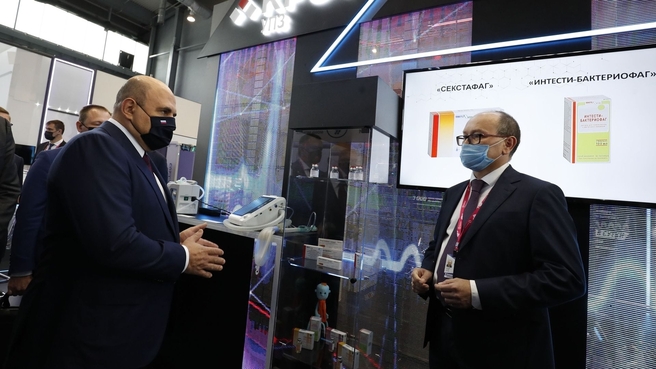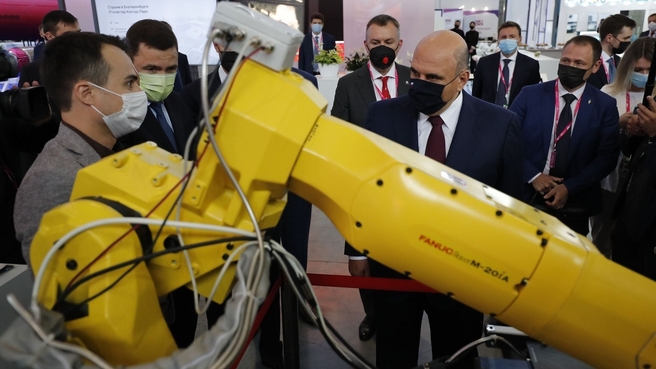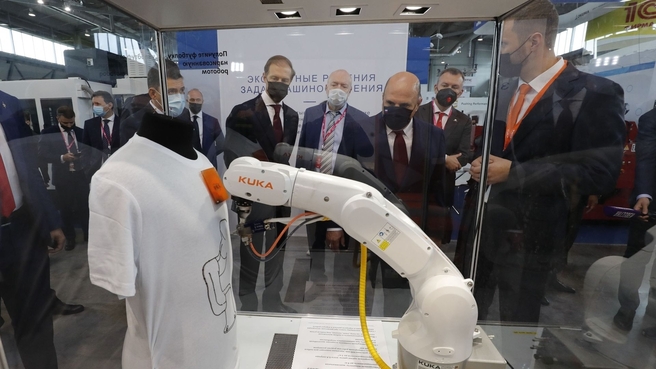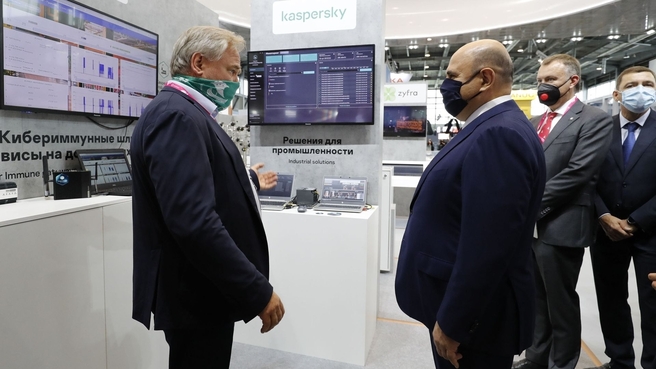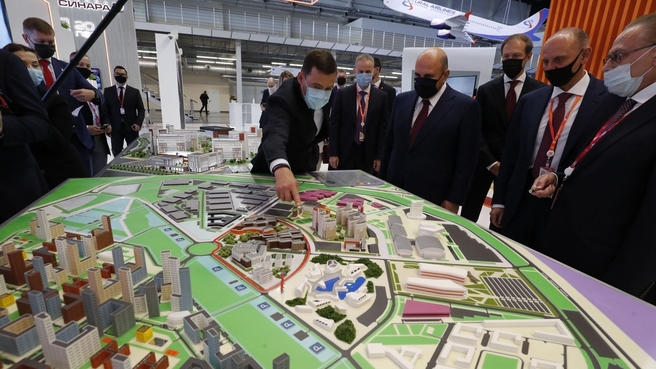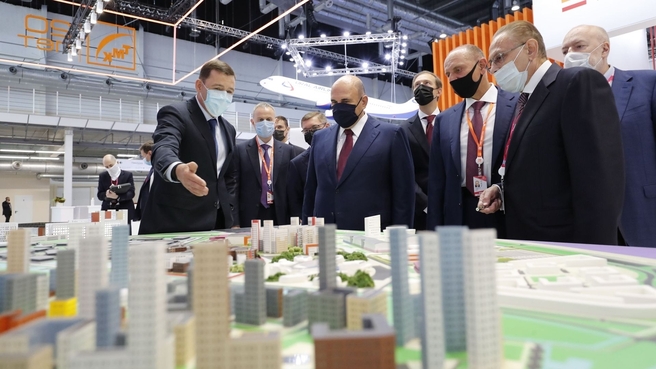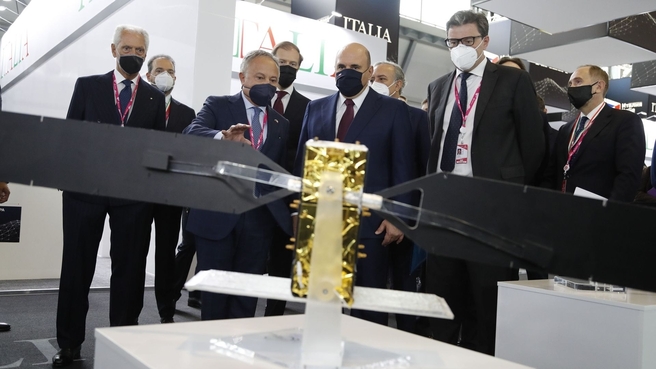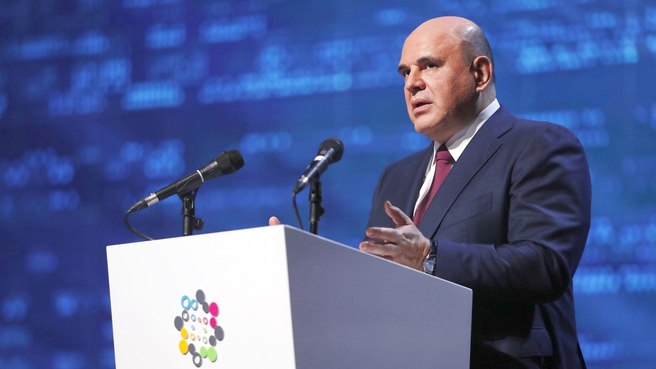The Prime Minister delivered remarks at Innoprom 2021’s main strategic session “Flexible Manufacturing: Ultimate Adaptation,” awarded the Industria National Industrial Award and toured the fair.
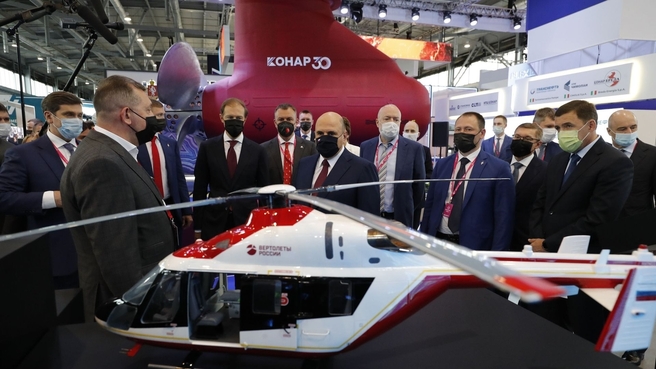
Mikhail Mishustin examining Rostec’s stand at the Innoprom 2021 International Industrial Trade Fair in Yekaterinburg
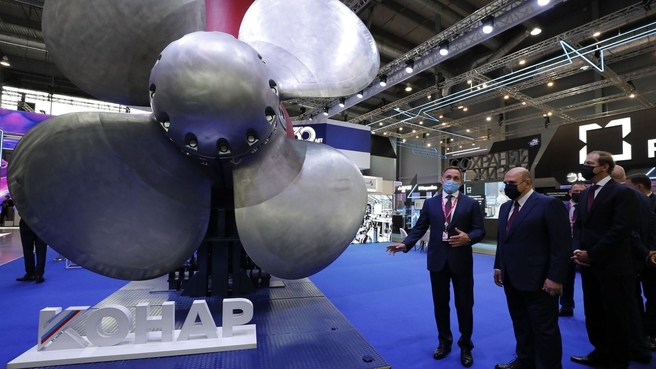
Mikhail Mishustin examining the joint stand of KONAR and Transneft at the Innoprom 2021 International Industrial Trade Fair
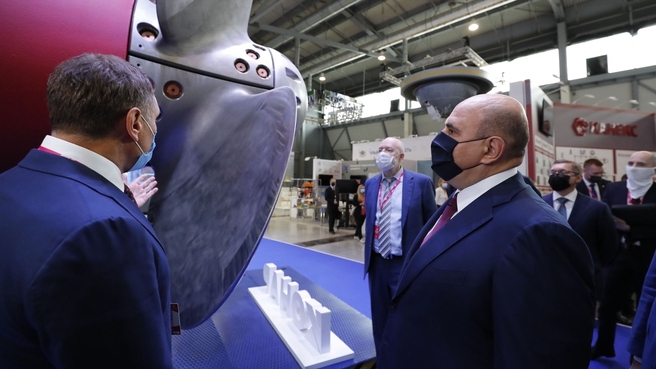
Mikhail Mishustin examining the joint stand of KONAR and Transneft at the Innoprom 2021 International Industrial Trade Fair
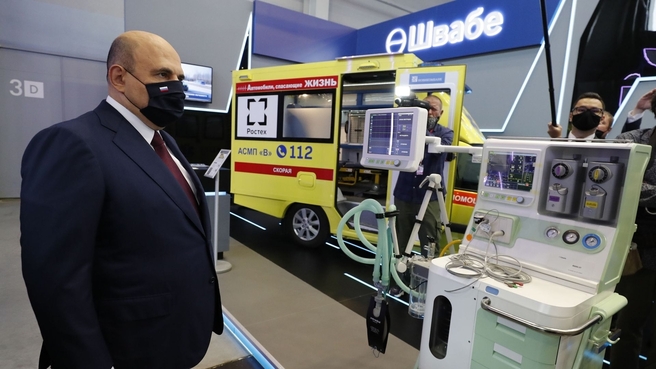
Mikhail Mishustin touring Innoprom 2021 in Yekaterinburg. Right: Shvabe’s MAIA-01 inhalation anaesthetic unit
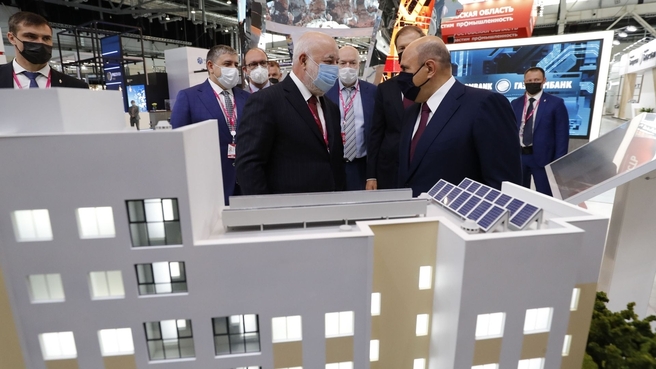
Mikhail Mishustin touring Innoprom 2021. With President of the Skolkovo Institute of Science and Technology (SkolTech) and Chairman of the Board of Directors for Renova Group Viktor Vekselberg
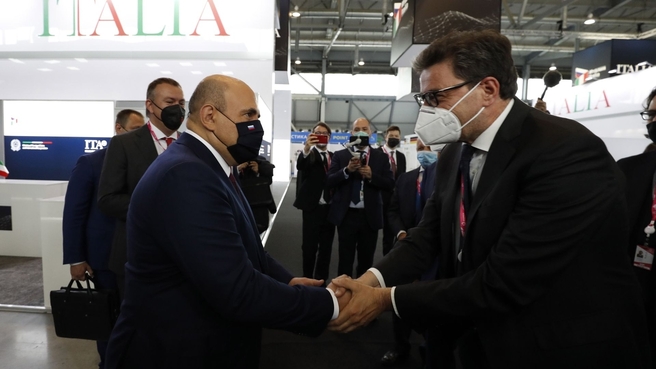
Mikhail Mishustin touring Innoprom 2021. With Italian Minister of Economic Development Giancarlo Giorgetti
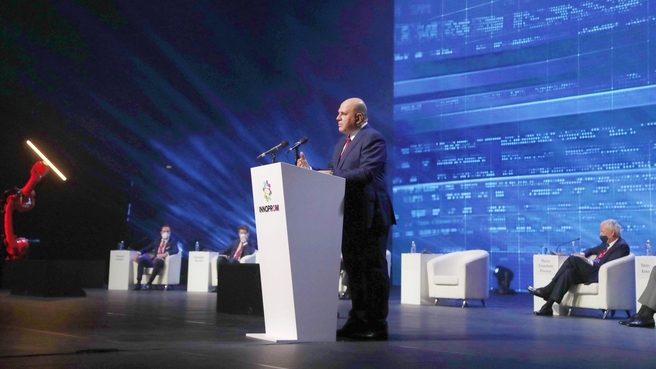
Mikhail Mishustin’s remarks at the Innoprom 2021 main strategic session “Flexible Manufacturing: Ultimate Adaptation”
Mikhail Mishustin examining Rostec’s stand at the Innoprom 2021 International Industrial Trade Fair in Yekaterinburg
Innoprom is the main industrial trade fair in Russia held annually in accordance with the Government Directive No 415-r dated 16 March 2011.
In 2021, the fair is being held for the 11th time. Innoprom 2021’s main topic is Flexible Manufacturing. This year Italy became the exhibition’s partner. The business programme includes over 150 events with more than 500 speakers and experts as well as heads of the largest companies representing about 20 countries. Over 13,000 are expected to take part in the discussions.
The National Industrial Award Industria, which is given annually to companies for scientific and technological breakthroughs and inventions in industrial manufacturing, is presented during Innoprom 2021 as well. This year, the award was given to the S-Innovations company.
Mikhail Mishustin’s speech:
Good afternoon, ladies and gentlemen, colleagues. Greetings to participants and guests of the International Industrial Trade Fair, which is deservedly considered the country’s main industrial venue.
Today, we are opening the 11th Innoprom in Yekaterinburg with 30 countries and over 600 Russian and international companies represented this year. The fair has brought together experts, entrepreneurs and government officials from Russia and many other countries. Italy, one of Russia’s main foreign trade partners, is the fair’s partner country. I would like to separately greet a representative delegation from that wonderful country. We have already had the chance to talk with some of our colleagues.
I’m very pleased to be here at Innoprom. Before the strategic session started, we toured the fair and the stands dedicated to hydrogen energy and robotics, and saw products developed by enterprises from the Sverdlovsk Region, the Rostec Corporation, the Almaz-Antey Concern and many other companies. We saw really interesting and promising projects on display. We have things to offer to our international partners.
I’m sure that much of what Innoprom participants and guests see here will open up new opportunities for them in business and engineering solutions and help them update their people-oriented services. Joint discussions will help find answers to difficult questions such as how the industry will change, what the government authorities can and should do for that, and most importantly what people will get as a result of this transformation. After all, technology not only makes our lives more convenient, but also creates an environment in which conventional methods become obsolete. We focus on these issues and discuss them with the professional community when developing our plans.
Flexible Manufacturing is Innoprom’s main theme this year. This framing of the question became especially relevant after humanity faced the coronavirus infection.
The pandemic has disrupted the established supply chains of industrial products, disrupted the conventional structure of demand in key markets, and affected industrial growth rates and production volumes.
Mikhail Mishustin: ”The pandemic has disrupted the established supply chains of industrial products, disrupted the conventional structure of demand in key markets, and affected industrial growth rates and production volumes. Such crisis situations require that we provide prompt responses to changes in consumer preferences.“
Such crisis situations require that we provide prompt responses to changes in consumer preferences, form a product line for the smallest possible
groups of buyers, and expand the range of goods within large series, as our
engineering industries are already doing. For example, elevator manufacturers
produce equipment that is designed to the specific needs of the customer based
on the specifications of the shaft, the required capacity and the speed.
We also need to build new supply routes to reduce delivery costs.
Businesses’ ability to quickly adapt their manufacturing capacities to making new products is an important factor in ensuring competitiveness. Flexibility has become a key parameter for efficient production since it minimises risk and reduces damage. The issue is about an innovative format for organising industrial capacity based on widespread use of digital technologies. Yesterday, we brought this up at a meeting with Russian and foreign businesspeople.
The coronavirus catalysed the shift in technology paradigms and boosted digitalisation processes. Entire sectors of the economy and industries, including banks, retailers, media, telecom, and municipal transport, have undergone comprehensive transformations.
To avoid personal contact, many services have been digitalised. The restrictions have formed an environment for developing telemedicine and distance learning. AI algorithms have become part of the healthcare industry (we saw one such algorithm at a stand today). CT and MRI imaging is now being analysed by artificial intelligence, and supercomputers have been used to develop drugs and vaccines to fight COVID-19.
At the peak of the restrictions, almost 45 percent of all companies converted to telecommuting. Information platforms have emerged that have made it possible to directly connect producers and consumers. E-commerce shot up by 60 percent in Russia to 3.2 trillion roubles.
The industrial sector comes next. In the coming years, it is necessary to take a decisive step towards full automation of technological processes and production, supply chains, and management decisions.
Mikhail Mishustin: ”Businesses’ ability to quickly adapt their manufacturing capacities to making new products is an important factor in ensuring competitiveness. Flexibility has become a key parameter for efficient production since it minimises risk and reduces damage. The issue is about an innovative format for organising industrial capacity based on widespread use of digital technologies.“
Russia boasts powerful resources in almost all key areas that underlie digital transformation. It is critically important to maximise this so that our industry can compete on the Russian and international markets.
We heard quite a few success stories today. For example, the domestic market for additive technologies has grown by over 10 times over the past decade. Today, our country enjoys a fairly prominent international position in this area. The industry employs about 2,000 people, of whom one third work in small- and medium-sized businesses. To increase competitiveness in this area, the Government has approved a 15-year Strategy for Developing Additive Technologies.
The creation of digital alter egos — three-dimensional computer prototypes of an industrial product, especially in the aerospace and automotive industries — has become a routine operation for the domestic industry. This technology helped create the Russian electric vehicle Kama-1. We inspected it during a recent trip to KamAZ.
We can safely say now that radio electronics will form the foundation for integrating modern science-intensive technologies, primarily, blockchain solutions which ensure safe industrial supply chains and improve coordination in automation, or the industrial internet of things, big data, artificial intelligence and 3D printing.
We have effective software and hardware system products. A number of domestic companies make processors for high performance computing and develop and implement complex supercomputer solutions.
The Government will continue to support the electronics industry. The three-year budget includes about 280 billion roubles for these purposes.
Mikhail Mishustin: ”The coronavirus catalysed the shift in technology paradigms and boosted digitalisation processes. Entire sectors of the economy and industries, including banks, retailers, media, telecom, and municipal transport, have undergone comprehensive transformations. The industrial sector comes next. In the coming years, it is necessary to take a decisive step towards full automation of technological processes and production, supply chains, and management decisions.“
It is especially important to create technologies of the future. Our country has everything it needs to succeed. Russia is traditionally strong in the engineering school of designers and programmers. We have experience in solving unique technical problems.
This is an intellectual basis for developing new competencies in areas where we are still lagging behind, primarily, robotics.
It would be a mistake to allow a technology lag to persist. In order not to waste time, we must, in conjunction with our foreign partners, take advantage of existing opportunities and implement industrial robotic systems now.
To this end, last year the Government approved a concept for regulating artificial intelligence and robotics technologies. Regulations have been put in place to financially stimulate the industry, including the public-private partnership mechanism.
Colleagues,
President Putin has announced the current year the Year of Science and Technology.
The task of promoting this country’s scientific and technological development has been given the national priority status. The Government has drafted effective measures of state support for industrial enterprises pursuing R&D. These apply to the development and introduction of advanced technologies to build flexible manufacturing facilities and the case in point is quite considerable investment.
Businesses may be partly recompensed for their expenses on scientific research, with the budget set to allocate 25 billion roubles for these purposes within a period of the next three years. There is also a fine opportunity to reduce expenditures on industrial internet of things by utilising the tool of subsidies for the development of digital platforms and software programmes. About 5.5 billion roubles have been set aside for this within the next three years.
Mikhail Mishustin: ”To digitise the industry in a rapid and safe manner, we will have to solve a number of systemic problems. First of all, it will be necessary to ensure cyber security, devise reliable data protection systems, and design efficient energy saving systems. We need a wholesale coverage of populated localities with broad-band internet and communications.“
Businesses can recoup up to 50 percent of their outlays on creating pilot batches of the means of production. The three-year budget allocates for this over 5 billion roubles. The Industrial Development Fund also supports the creation of new digital factories. Nine projects have already received support totaling 2 billion roubles.
To back domestic industries, we have launched SPIC 2.0 that makes investment strictly dependent on introducing state-of-the-art technologies and creating competitive products. The mandatory condition for signing new special investment contracts is for the regions to take part in this work. It is essential that all regions of the Russian Federation, which have missed doing this, should promptly enact the necessary laws and regulations.
Apart from that, the Government is working to launch new tools. We are ready to increase the funding for all highly efficient support measures, with a special focus, certainly, on enterprises in the defence industrial complex running civilian manufacturing programmes as part of the diversification drive.
To digitise the industry in a rapid and safe manner, we will have to solve a number of systemic problems. First of all, it will be necessary to ensure cyber security, devise reliable data protection systems, and design efficient energy saving systems. We need a wholesale coverage of populated localities with broad-band internet and communications.
There is a lot of work ahead of us. Prospectively, technological lead will be consolidated by countries that will be able, among other things, to transform industries in a rapid and successful way. Today, every effort should be concentrated on the initiatives that will make it possible to change the domestic industry’s structure. Russia’s global competitiveness is hinging on this.
The production model of the future is about doing it “rapidly, with high quality, and at a low cost.” Within the next ten years, it is necessary to double equipment efficiency, increase the number of high-technology jobs by 50 percent and cut the development and marketing costs in the case of high-technology products by 50 percent.
It is these targets that the Government has included in the Strategy of Digital Transformation of Industry, which will be approved shortly.
Mikhail Mishustin: ”The production model of the future is about doing it “rapidly, with high quality, and at a low cost.” Within the next ten years, it is necessary to double equipment efficiency, increase the number of high-technology jobs by 50 percent and cut the development and marketing costs in the case of high-technology products by 50 percent. It is these targets that the Government has included in the Strategy of Digital Transformation of Industry, which will be approved shortly.“
To implement this new systemic approach, we need skilled professionals. Technological progress is carrying out drastic changes for the labour market and influencing the emergence of new professions, such as a robotic system operator, information system architect, cyber researcher (there is such a new profession), virtual architect, and many others. And, of course, this calls for an overhaul of the entire education system. Today, young people enjoy a practically unlimited access to information and possess advanced digital competences. The traditional approaches to instruction make it impossible to tap their potential in full measure. Educational establishments must respond more flexibly to changes brought about by the scientific and technological progress. It is important that the education system and the labour market are mutually coordinated. We must have no situations where an industry lacks the necessary number of professionals. For example, experts estimate that the labour market is short of 19,000 robot service personnel. It is a serious deterrent. But we have good examples as well. Universities are training about 80,000 additive technology specialists. Skilled workers are in extremely high demand. We discussed these matters in detail during my visit to Rostov-on-Don. Today, these specialists should learn to operate equipment based on new technologies, including artificial intelligence. Special retraining programmes need to be introduced. We have launched the Young Professionals federal project precisely to upgrade the secondary professional education system. The three-year budget allocates for this project nearly 22 billion roubles.
Colleagues, friends,
These are just a few factors of a fundamentally new format for organising industrial capacities, a format based on a wide use of digital technologies, something that will make it possible to change the structure of the domestic industry.
Innoprom offers a good opportunity to present new R&D and ideas and evolve mutually beneficial cooperation arrangements for the future. I am confident that the discussions that will take place here over the next few days will help to produce optimal solutions.
I would like to wish you all productive discussions and every success.
